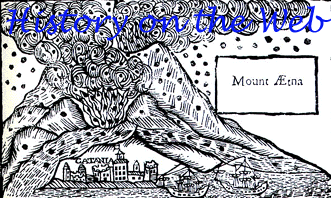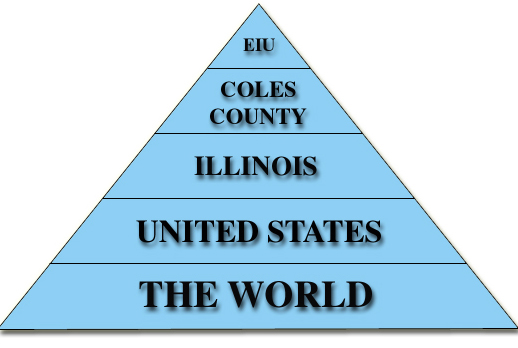 (Listing reputable and useful history teaching & research
sites, libraries and museums online, and organizations of
teachers and historians)
(Listing reputable and useful history teaching & research
sites, libraries and museums online, and organizations of
teachers and historians) History Teachers Conference
October 29, 1999
Terry Barnhart & Newton Key, Dept. of History, Eastern Illinois University
– (Listing reputable and useful history teaching & research
sites, libraries and museums online, and organizations of
teachers and historians)
(Listing reputable and useful history teaching & research
sites, libraries and museums online, and organizations of
teachers and historians)
– (documents, graphics, timelines, histories, and finding aids for
the history of Eastern Illinois University, Charleston, Coles
County, Illinois, United States, and the World; coming soon: the
Coles County Legal History Project, an online database of
19th-century legal cases and documents)
(documents, graphics, timelines, histories, and finding aids for
the history of Eastern Illinois University, Charleston, Coles
County, Illinois, United States, and the World; coming soon: the
Coles County Legal History Project, an online database of
19th-century legal cases and documents)
– (an interdisciplinary
organization of scholars developing the educational potential of
the Internet [email listservs] and the World Wide Web [related
websites])
(an interdisciplinary
organization of scholars developing the educational potential of
the Internet [email listservs] and the World Wide Web [related
websites])
– (sites
selected using the nationally recognized merit review process
developed by the National Endowment for the Humanities)
(sites
selected using the nationally recognized merit review process
developed by the National Endowment for the Humanities)
– (Library of Congress
webpage; over 60 collections now online)
(Library of Congress
webpage; over 60 collections now online)
– (family
life in Illinois from 1700 to the present)
(family
life in Illinois from 1700 to the present)
–The Digital Classroom (materials from the National Archives and methods for teaching with primary sources)
– (takes
two communities, one Northern and one Southern, through the
experience of the American Civil War; includes thousands of
newspapers, letters, diaries, photographs, maps, church records,
population census, agricultural census, and military records for
the period before, during, and after the Civil War for Augusta
County, Virginia, and Franklin County, Pennsylvania)
(takes
two communities, one Northern and one Southern, through the
experience of the American Civil War; includes thousands of
newspapers, letters, diaries, photographs, maps, church records,
population census, agricultural census, and military records for
the period before, during, and after the Civil War for Augusta
County, Virginia, and Franklin County, Pennsylvania)
– (Multimedia
documents from the Reformation to the Present)
(Multimedia
documents from the Reformation to the Present)
– (includes: Medieval
History Sourcebook; written and maintained by medieval scholars;
articles judged by at least two peer reviewers.)
(includes: Medieval
History Sourcebook; written and maintained by medieval scholars;
articles judged by at least two peer reviewers.)
The New Frontier: History Educators and the Web
The use of the Internet as a teaching and research tool has arrived. Effective teaching, research, and community outreach increasingly requires that historians and educators be not only users but also creators of interactive web sites. Integrating computer technologies into teacher training at both the graduate and undergraduate level is becoming an increasingly important consideration for universities, state boards of education, and all stakeholders in the development of curricula in the public schools. The National Council for the Accreditation of Teacher Education recognizes the vital importance of teaching future teachers and high school students to use on-line resources.
The Internet is not a substitute for texts and the lesson plans of teachers, but a supplement to them. Web sites can help teachers advance the goals and learning standards articulated in the Illinois Learning Standards relating to history. Web-based resources help teachers and students promote an understanding of historic eras, events, trends, individuals, and movements shaping the history of Illinois, the United States, and other nations. On-line, interactive curricula enable students to apply the skills of historical analysis and interpretation to the study of on-line documents and discussions of historical issues.
A word of caution about the Web is also in order. Teachers must guide their students toward the use of web sites that are based upon sound scholarship and away from those which offer the instant expertise of Mickey Mouse history. Toward that end, we offer this list of web sites that promote study of history in meaningful ways. Our purpose today is to visit and discuss a few of them together.
Evaluating a website's worth:
last updated Oct. 29, 1999